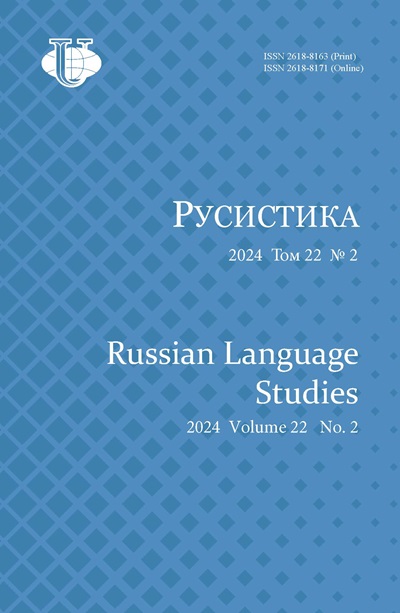Search
Issue
Title
Authors
|
Liu Di -. |
|
Orlova E.V. |
|
Shmelkova V.V. |
|
Ozyumenko V.I. |
|
Rumjanseva N.M. |
|
Abrosimova O.L., Voronova L.V. |
|
Erofeeva I.N., Popova T.I. |
|
Nikunlassi A.O., Loginova A.D., Ufimtsev G.V., Protassova E.Y. |
|
Moskovkin L.V. |
|
Okoedion E.G., Okolie U.C. |
|
Hmira T. |
|
Pivovar Y.S. |
|
Antonova L.N., Tolstyakova K.P. |
|
Korostova S.V. |
|
Sotova I.A., Kolesova N.N. |
|
Koltsova L.M., Kudryavtseva T.Y., Churikov S.A. |
|
Penyukovа I.V. |
|
Polychronidou S. |
|
Bocharova M.A. |
|
Baryshnikova E.N., Shtyrina E.V. |
|
Shustikova T.V., Žurkina N.V. |
|
Mikova S.S. |
|
Demeneva K.A. |
|
Krasnova L.S. |
|
Amiri M.A., Madayeni Avval A. |
|
Fedosova J.A. |
|
Matveenko V.E. |
|
Ignatovitch T.V. |
|
Semaan N.V., Demesheva E.N., Baher T.V. |
|
Nikitina T.G. |
|
Vasilieva M.I. |
|
Bartosh J.V. |
|
Rozboudova L., Konecny J., Markova E.M. |
|
He X. |
|
Sotova I.A. |
|
Mamontov A.S., Moroslin P.V. |
|
Zhao Z. |
|
Baranova I.I. |
|
Polyakova (Pashkina) E.S. |
|
Zavarzina G.A. |
|
Vasilyuk I.P. |
|
Sujuan Wu -. |
|
Baryshnikova E.N. |
|
Kudoyarova T.V. |
|
Loginova I.M. |
|
Telkova V.A. |
|
Kurguzenkova Z.V. |
|
Ratsiburskaya L.V., Zhdanova E.A. |
|
Khavronina S.A., Emrak K. |
|
Zhiltsov V.A., Maev I.A. |
|
Shakolo A.V. |
|
Poplavskaia T.V. |
|
Kozdra M. |
|
Duryagin P.V. |
|
Petrova S.M. |
|
Faje F.D. |
|
Tall Useinu -. |
|
Vodopianova K.M. |
|
Iljina S.A., Ivanova I.S. |
|
Shtirina E.V. |
|
Orlova E.V. |
|
Shaklein V.M. |
|
Granatova Y., Baryshnikova E.N. |
|
Konstantinova L.A., Pronina E.V. |
|
Talibina E.V., Polyakova E.V., Minakova N.A. |
|
Zahraee H.S. |
201 - 266 of 266 Items
<< < 1 2 3
Search tips:
- Search terms are case-insensitive
- Common words are ignored
- By default only articles containing all terms in the query are returned (i.e., AND is implied)
- Combine multiple words with OR to find articles containing either term; e.g., education OR research
- Use parentheses to create more complex queries; e.g., archive ((journal OR conference) NOT theses)
- Search for an exact phrase by putting it in quotes; e.g., "open access publishing"
- Exclude a word by prefixing it with - or NOT; e.g. online -politics or online NOT politics
- Use * in a term as a wildcard to match any sequence of characters; e.g., soci* morality would match documents containing "sociological" or "societal"











